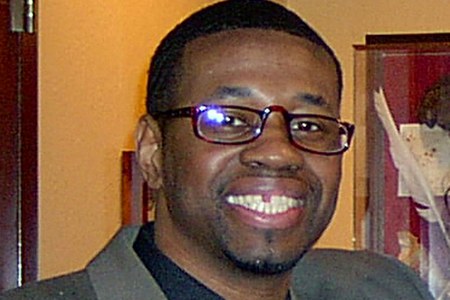Stephan Cowans

On Jan. 23, 2004, having proclaimed his innocence for over five-and-a-half years, Stephan Cowans walked out of the Suffolk Superior Court in Boston. On Feb. 2, 2004, he became the 141st person in the United States to be exonerated as a result of post-conviction DNA testing.
The Crime
On May 30, 1997, an officer of the Boston Police Department was shot twice with his own service weapon in the backyard of a house in Jamaica Plain following a short struggle with an unknown assailant. The assailant fired an additional shot at an individual who was standing in the window of a second-floor bedroom. The assailant ran from the scene, leaving the baseball hat he was wearing. He forcibly entered a nearby home, where he stopped to drink from a glass of water. The assailant then fled, leaving both the gun and the sweatshirt he had been wearing.
The Investigation
Approximately two weeks later, the injured police officer identified Stephan Cowans from a photo array composed of eight photographs. On July 2, 1997, the officer attended a lineup and once again singled out Cowans as the man who had shot him. On that same day, the individual who had been watching from his second-floor bedroom window also identified Mr. Cowans as the assailant.
The family who had been present in the home that the assailant had forcibly entered, and who had spent the most time with the assailant, did not identify Mr. Cowans from the lineup.
The Trial
At trial, the Commonwealth used these identifications to convict Mr. Cowans. The Commonwealth also relied upon a latent fingerprint that had been found on the glass mug used by the assailant. Prosecutors presented expert testimony asserting that the latent fingerprint matched Mr. Cowans’ left thumbprint.
The Exoneration
On May 22, 2003, the Suffolk Superior Court issued an order approving a stipulation — entered into between the Innocence Project, Mr. Cowans’ counsel, and the Commonwealth — for the release of the glass mug, swabs taken from the mug, a baseball hat, and the white sweatshirt for the purposes of DNA testing. The tests revealed conclusive results. The primary profile located on the baseball hat matched the profile located on the swab taken from the rim of the glass mug used by the attacker. Mr. Cowans was excluded as the source of the DNA on these items.
In January, 2004, the Commonwealth requested that the white sweatshirt worn by the assailant also be submitted for DNA testing. The results revealed the same profile found on the baseball hat and the swab of the glass mug, and once again did not match the DNA profile of Mr. Cowans.
After reviewing the DNA test results, the Suffolk County District Attorney re-analyzed the fingerprint that had been used to convict Mr. Cowans. This re-examination showed that the fingerprint did not actually belong to Mr. Cowans.
On Jan. 23, 2004, Cowans walked out of prison and into his family’s embrace. He had been incarcerated for five-and-a-half years for a crime he did not commit.
Tragically, on Oct. 26, 2007, Stephan Cowans was found slain in his home.

Time Served:
6 years
State: Massachusetts
Charge: Armed Assault with Intent to Murder, Home Invasion, Assault and Battery by Means of a Dangerous Weapon, Armed Robbery, Assault and Battery on a Police Officer, Assault by Means of a Dangerous Weapon, Unlicensed Possession of a Firearm
Conviction: Armed Assault with Intent to Murder, Home Invasion, Assault and Battery by Means of a Dangerous Weapon, Armed Robbery, Assault and Battery on a Police Officer, Assault by Means of a Dangerous Weapon, Unlicensed Possession of a Firearm
Sentence: 30 to 45 years
Incident Date: 05/30/1997
Conviction Date: 06/30/1998
Exoneration Date: 02/02/2004
Accused Pleaded Guilty: No
Contributing Causes of Conviction: Eyewitness Misidentification, Government Misconduct, Unvalidated or Improper Forensic Science
Death Penalty Case: No
Race of Exoneree: African American
Race of Victim: Caucasian
Status: Exonerated by DNA
Type of Crime: Other
Forensic Science at Issue: Other
Year of Exoneration: 2004